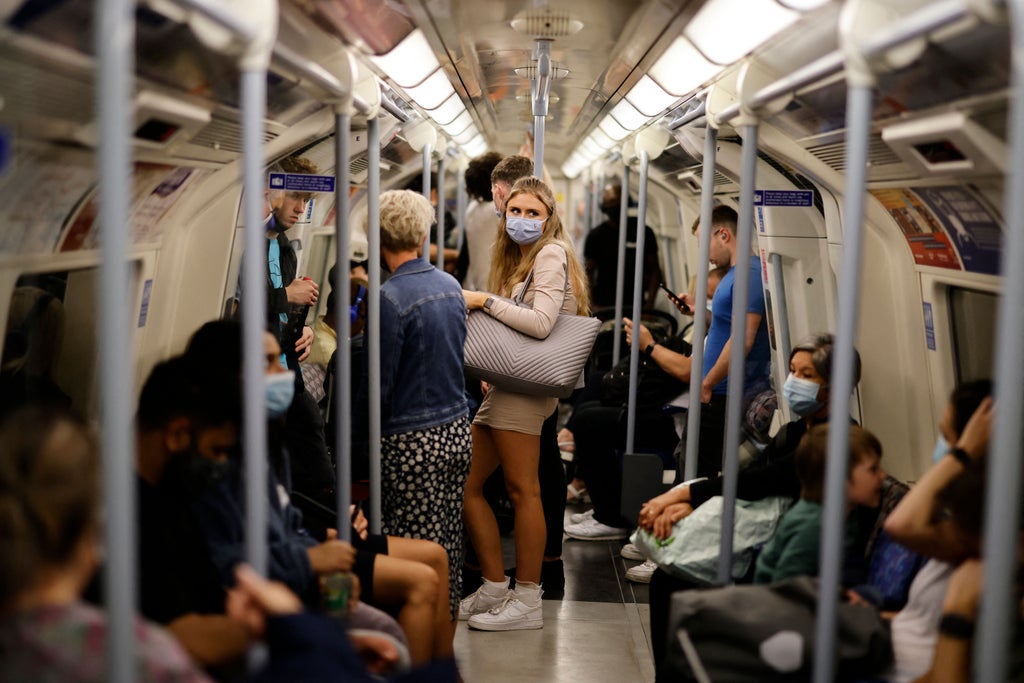Why does the UK have a higher Covid rate than Europe?
Cases of Covid-19 in the UK are currently among the highest in Europe and are higher than they were this time last year, when parts of England were under local lockdowns.
The vaccine has meant that although case numbers are elevated, there are fewer cases of people with serious illness having to be treated in hospital.
However, the more that the virus is able to spread, the more chance there is of it finding a way to break through vaccine defences.
Follow Covid news – live: NHS chiefs urge government to implement winter ‘plan B’
Figures show that the number of people testing positive for coronavirus currently stands at more than 40,000 per day. Hospital admission numbers are still below levels seen last autumn, although they are rising gradually.
According to Professor Neil Ferguson, a member of the Scientific Advisory Group for Emergencies (Sage) from Imperial College London, there are “a number of reasons” why the UK currently has higher infection levels than many other European countries.
Speaking on BBC Radio 4’s Today programme, the professor suggested that the UK has “lower functional immunity in our population than most other western European countries” for a number of reasons.
According to Professor Ferguson these reasons include the vaccine rollout starting earlier in the UK than elsewhere and the fact that “we relied more on the AstraZeneca vaccine”.
There are other suggestions that less mask wearing, more relaxed rules around mixing and a slowing vaccine rollout could also be behind the surge in figures. But why exactly are cases of Covid rising in the UK?
Waning immunity?
The UK was one of the fastest countries in the world to rollout the Covid-19 vaccine, meaning that immunity of some of those who were first vaccinated may be lower now.
A study of Covid test results of vaccinated people who logged their symptoms in an app, suggested that after about five or six months, the protection against catching the virus wanes significantly.
In Israel, which was one of the fastest countries in the world to vaccinate its population, a spike in case numbers was seen as immunity began to wane, according to scientists.
Cases did however level off once enough older people had been given a booster dose.
Boosters are now also being given to older people in the UK, with 3.7 million doses administered in England by 17 October.
Reliance on AstraZeneca?
When the UK started its vaccine rollout, it relied more on the AstraZeneca vaccine than the Pfizer jab. AstraZeneca is slightly less effective against the Delta variant of the virus which could be in part to blame for the increased case numbers.
According to Professor Ferguson, this could be partly behind the rise in Covid cases. He said: “We relied more on the AstraZeneca vaccine and, while that protects very well against very severe outcomes of Covid, it protects slightly less well than Pfizer against infection and transmission, particularly in the face of the Delta variant.”
Less mask-wearing?
A study carried out by Imperial College London indicated that UK residents were significantly more likely than people in Germany, France, Spain and Italy to say that they no longer wear a face mask or covering.
A number of studies have shown that face masks can help stop the virus from being passed between people. However it is not possible to say whether or not the lack of interest in wearing facemasks in the UK is directly responsible for the surge in case numbers.
Indeed, people in Sweden and the Netherlands were more likely than those in the UK to say that they never wore a mask, according to a survey, and these countries have fewer confirmed Covid cases than the UK.
More relaxed rules and increased mixing?
The UK was one of the fastest western European countries to relax restrictions meaning that those living in England, Wales and Scotland have been able to go out to nightclubs and attend mass gatherings since the summer. This was several months before many other countries.
Data from the Imperial College survey also suggests people in the UK are somewhat more likely than their European neighbours to use public transport. Those living in the UK are also less likely to avoid going out.
A further survey of contacts and mixing in the UK indicated that there had been relatively little change in mixing in recent weeks.
Although more and more people are going to work in person, numbers of people in the office remain quite low, with only around half of employees going into their workplace if it is open.
Slowing vaccine rollout?
The UK’s vaccination rollout has stalled in recent months and its rate of fully-vaccinated people is no longer in the top 10 countries with a population of at least 1 million.
Indeed, in the first two weeks of October, the numbers of UK residents aged 12 and over who had received at least one dose of the vaccine hardly changed.
These figures are slightly skewed by the low uptake of doses in children. As it stands, only 15 per cent of 12 to 15 year olds in England have received one shot of the jab.
What about the new Delta descendant?
A new descendant of the Delta variant, called AY.4.2, has been discovered in the UK and already accounts for nearly 10 per cent of cases in the country.
Scientists have suggested that it appears to be 10 to 15 per cent more transmissible than the original Delta coronavirus, but it cannot be entirely blamed for the rise in UK Covid cases.


